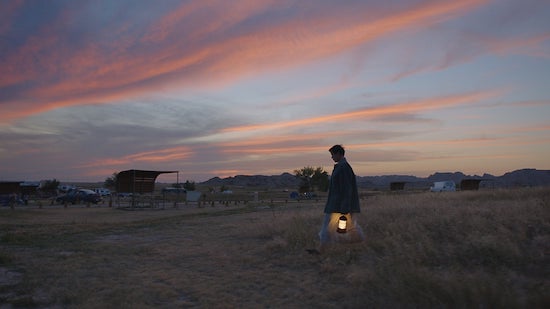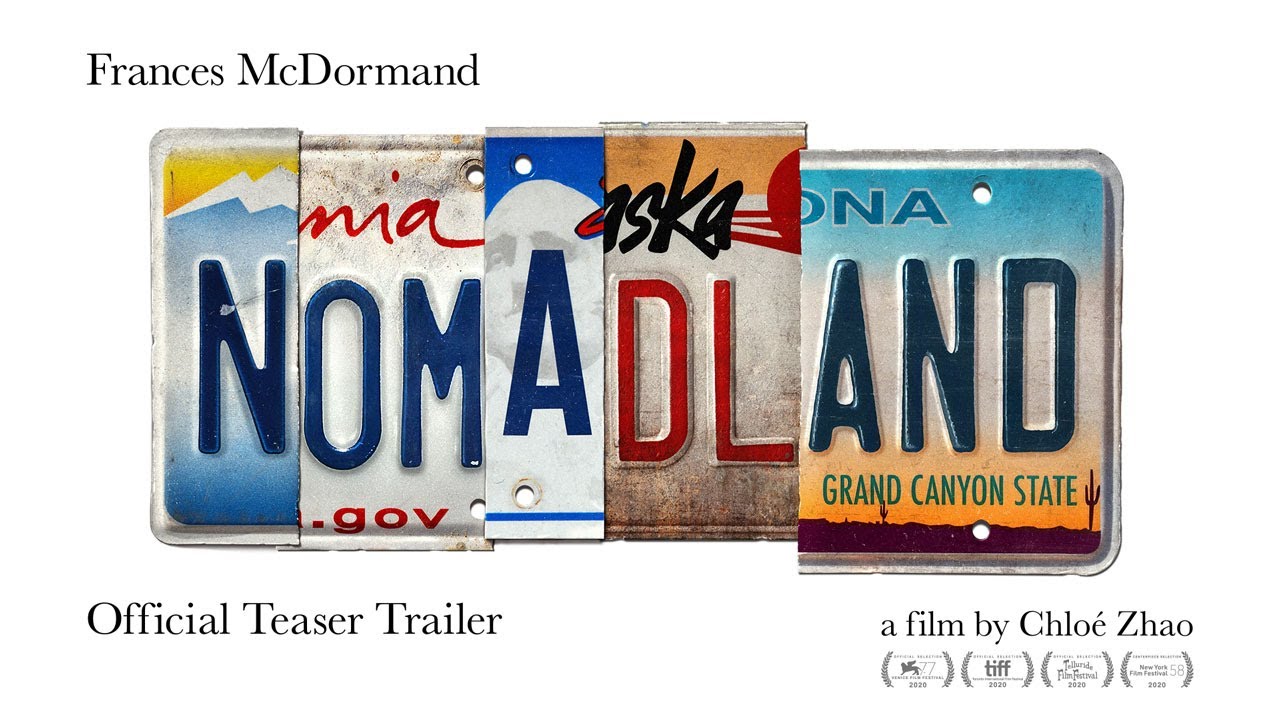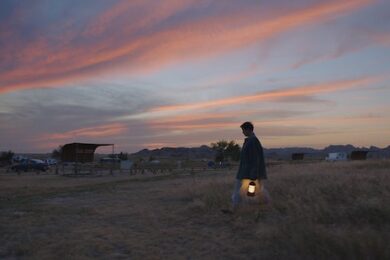“The last free place in America is a parking spot,” writes Jessica Bruder in Nomadland: Surviving America in the 21st Century, the book upon which Chloé Zhao’s stunning film Nomadland is based. This excerpt speaks to the idea that most things, even and especially people’s lives, have been reduced to mere commodities in modern America. In an increasingly unequal and materialist society, a new type of community has emerged: that of the modern-day, van-dwelling nomad, roaming the American West.
Fern, solemnly played by Frances McDormand in a career-best performance, is one such nomad. The film offers an intimate yet devastating look at her life as she copes with losing everything (including her husband) in the Great Recession, whilst simultaneously giving a subtly scathing view of the ruthless pressures of late-stage capitalism. McDormand is joined by a terrific cast of non-professional actors – real-life nomads playing fictionalised versions of themselves – who fit perfectly with Zhao’s filmmaking style, at times lending itself to cinéma vérité but also sharing a grandeur reminiscent of Terrence Malick through spiritual undercurrents and epic natural beauty (hats off to Zhao’s regular cinematographer Joshua James Richards, who similarly captured the Yorkshire Dales in Francis Lee’s God’s Own Country).
“I’m not homeless, I’m just houseless,” Fern proudly declares, touching upon the materialism which is deeply internalised in Western culture. We are posed with the question: “Is home just a word, or is it something we carry with us?” For Fern and the rest of the nomads, it is clearly the latter. After all, Fern spent the majority of her life living with her husband in Empire, Nevada – a town which, despite being specially-built by United States Gypsum Corporation for its labour force, Fern and her husband called home and lived happily for many years. But when USGC shut up shop, so did the town; the zip code was discontinued and the workers and their families were sent on their way, thrown out like obsolete machinery. Ironically, the town was located not far from where Burning Man takes place. What started as a radical counterculture event in the 1990s is now more of a Coachella affair attended by narcissistic influencers.
Perhaps due to their shared hardship or age-gained wisdom (almost all the nomads are reaching traditional retirement age, some having worked all their lives only to discover their social security pension is near non-existent), Fern and the other nomads have little care for material possessions. They carry the bare essentials and sentimental items only. Fern uses a bucket as a toilet, upgrades her van for maximum storage space, and clings to her late husband’s jacket like life itself. At one of the campsites, the nomads have a ‘free stuff pile’ where they recycle and reuse unwanted items. Resources are pooled, food is shared, and waste is minimised.
By living so simplistically and communally, Fern and the rest of the nomads reject the capitalist system which has failed them, instead choosing to exist on its fringes. Yet Fern must still take seasonal work from one of the only places she can: an Amazon warehouse, the absolute embodiment of late-stage capitalism and Western materialism. Owned by the richest man on Earth, the firm processes cheap goods made by child labourers working long hours for pittance, whilst its local seasonal workers live on campsites and in vans.
But the denunciation of materialism in Nomadland runs deeper than merely condemning the act of hoarding capital and possessions, or even destroying lives and the planet for profit. The film also takes aim at metaphysical materialism, a school of philosophy which asserts that material matter is the most fundamental substance in nature, and that everything – including consciousness – arises from it. As most of the characters are in, or are reaching, their senior years, they contemplate the inevitable. Fern is widowed, Fern’s friend Swankie deals with a terminal illness and delivers a heartbreaking monologue as she plans her final days, and others have lost children to suicide or openly talk about how they’ve considered it themselves. But there is a sense throughout the film that death is something not to be feared, merely the next stop in the journey of existence. Whether it be days, months, or even lifetimes, the nomads assure each other: “See you down the road.”
The idea that physical death is not the end is a belief that many ancient and indigenous cultures and religions from around the world share. Take the Zuruahã tribe in the Brazilian Amazon, who believe that the soul is reunited with lost loved ones after death. This belief is so deeply ingrained that the leading cause of death among adult Zuruahã is suicide; when faced with hardship, such as the loss of their spiritual homeland, they choose to rejoin their lost relatives.
Much of the inherently materialist Western world might dismiss such beliefs, but there is undoubtedly a clear parallel between perhaps the least materialist group of humans on Earth having little fear of physical death, and the van-dwelling nomads who, upon rejecting materialism, also begin to find peace in their mortality.
It’s difficult to imagine that such ideas would ever become widely accepted by materialists, or, similarly, that the Zuruahã would ever adopt the belief that physical death is in fact ‘the end’. After all, these are two polar opposites on the spectrum of metaphysics. But if we can at least accept that there is more to our reality than the solid, material things which surround us – the way we feel, shared experiences, our soul – then with it may come a certain sense of inner peace and acceptance, something which the nomads, and Nomadland itself, have tapped into.
Nobody understands this better than Swankie. She knows she will die without treatment. But rather than checking herself into a hospital and risk dying on a ward, she decides to take one final trip to Alaska to go canoeing, surrounded by nature and her beloved memories. She had been there once years ago, surrounded by a flock of hatching swallows. “My life was complete,” she reminisces to Fern, as she explains her decision. “If I’d died in that moment, I’d be fine.” Before her final journey, she gives away most of her belongings. She sheds what little material possessions she has left in a rite of passage before her ultimate material possession, her body, must also be let go of. But Swankie isn’t afraid. And why would she be? Like the Zuruahã, she is certain that she will see the ones she’s loved and lost again, some way down the road.
When viewed through this lens, the film’s deserts, forests, mountains and coasts become a reflection of Fern’s psyche and emotional state. Her isolation is amplified in the vast expanse of the Black Rock Desert, as she battles against violent waves of grief which come crashing against the West Coast shore – contrasting with her moments of healing and reflection as she bathes naked in a river deep in the San Bernardino National Forest. (Ludovico Einaudi’s ethereal score is the perfect accompaniment to these scenes). The film’s roads become an experiential guide through which we can come to terms with our own mortality. By joining Fern on her spiritual journey, we are reminded of the important things in this life: simple pleasures, friendships, memories. Nobody can say for sure what happens when we die. But one thing is for certain: the ones who love us will always remember us. In the words of Fern’s father, who she quotes carefully, “What’s remembered, lives.”
Nomadland is now out in the US. The film will be released in the UK on February 19, 2021




